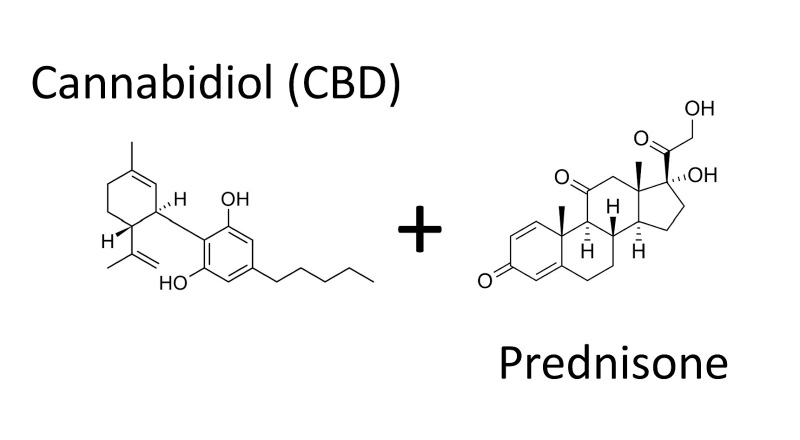
B_____’s question:
I just finished my CannyNurse program last week and LOVED it–so now I’ve met a person in my town who has Polymyalgia Rheumatica–is on prednisone–and wants to use cannabis. Can you help me with info on using CBD with Prednisone? I’m going to treat his Polymyalgia rheumatica as a type of RA and let the research you offer be a great spring-board for us to start experimenting….I’m just not sure about the steroid interfering….Your thoughts deeply appreciated!
Uwe’s answer:
Thanks for your kind words, and sorry about the late reply.
First, I’m not a physician and cannot dispense medical advice. However, I can share some evidence-based information that may help you make more informed and discerning decisions.
As you may already know that the use of corticosteroids such as prednisone is a common and powerful pharmacological treatment approach to reduce or tame the ill effects of an over-reactive immune system. The trade-offs are common adverse effects such as weight gain, anxiety, insomnia, rapid changes in mood, weakness, and an increased risk for osteoporosis and infections. Given the evidence that cannabis-based therapeutics may provide therapeutic support to mitigate Obesity (Metabolic Syndrome), Mood Disorders (Anxiety), Osteoporosis, and of course, it may help to address a key symptom of autoimmune disorders, i.e., immune over-reactivity (e.g., Rheumatoid Arthritis) it may turn out that cannabis-based therapeutics may induce complementary or even synergistic results.
However, this hope is tempered by what we know about how both prednisone and some cannabis constituents, primarily CBD, are metabolized. The liver metabolizes prednisone into prednisolone, mostly broken down by an enzyme belonging to the cytochrome P450 family. More specifically, the enzyme CYP3A4.1 CBD inhibits CYP3A4. As such, the effects of CBD may be diminished, or the effects of prednisone may be enhanced, including both prednisone’s therapeutic or adverse effects potential.2 And while CBD may become a steroid-sparing agent, i.e., an agent that allows for the induction of the optimal therapeutic effect with lower steroid dosages, the co-administration of CBD-based products and prednisone ought to be ideally guided by a cannabis-educated physician. To my knowledge, no data currently exists examining replacing prednisone with CBD. Still, clinical trials are looking at CBD as a steroid-sparing agent for auto-immune patients with Crohn’s Disease.3
Anecdotally, CBDA has also been employed to induce potentially beneficial anti-inflammatory effects that may be helpful for patients with chronic inflammation of auto-immune origins. However, raw cannabis and respective cannabinoid acid forms have not been extensively studied, and their prednisone interaction potential has not been examined.
Endnotes:
1. Pharma KB. Prednisone, Pharmacokinetics. https://www.pharmgkb.org/chemical/PA451100
2. Yamaori S, Ebisawa J, Okushima Y, Yamamoto I, Watanabe K. (2011 Apr) Potent inhibition of human cytochrome P450 3A isoforms by cannabidiol: role of phenolic hydroxyl groups in the resorcinol moiety. Life Sci. 88(15-16):730-736.
3. ClinicalTrials.gov Identifier: NCT04056442. A Phase 2a Study to Evaluate the Safety, Tolerability and Efficacy of Cannabidiol as a Steroid-sparing Therapy in Steroid-dependent Crohn’s Disease Patients. Study Link
Disclaimers: the information in this email and the information contained in the embedded links/site is provided for informational purposes only and is not meant to substitute for the advice provided by your own physician or other medical professional. You should not use the information contained herein for diagnosing a health problem or disease. If using a product, you should read carefully all product packaging. If you have or suspect that you have a medical problem, promptly contact your health care provider.
Information on this site is based on scientific studies (human, animal, or in vitro), clinical experience, or traditional usage as cited in each article. The results reported may not necessarily occur in all individuals. For many of the conditions discussed, treatment with prescription or over-the-counter medication is also available. Consult your physician, nutritionally oriented health care practitioner, and/or pharmacist for any health problem and before using any supplements or before making any changes in prescribed medications.

